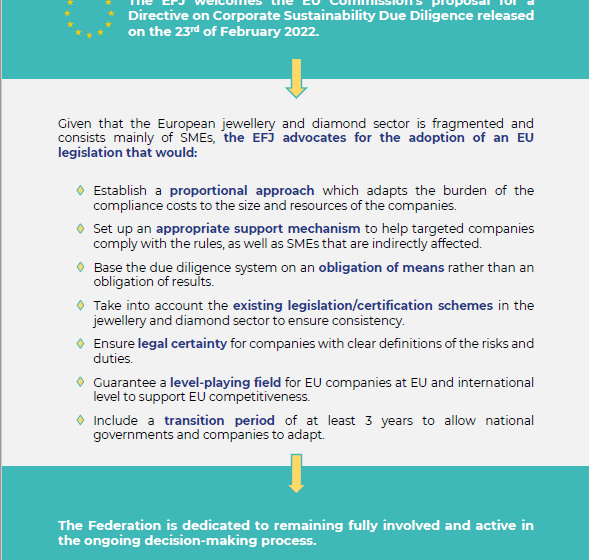A future-oriented General Assemblyof the European Federation of Jewellery in Brussels
The EFJ members had the pleasure to meet in person for the General Assembly on the 17th of April 2024 in Brussels, in the heart of the European quarter.
On the eve of a new European Parliament and a new European Commission, it was a good opportunity to exchange views on the sector’s future priorities. “Thanks to our efficient work and cooperation, we have consolidated the Federation’s position as a key stakeholder within the European institutions. We will continue this approach in the next legislative period to ensure that the needs of the European jewellery sector will be taken into account.” stressed Bernadette Pinet-Cuoq, President of the European Federation of Jewellery.
The EFJ members also reaffirmed that one of the sector’s top priorities is to ensure the free movement of jewellery articles. Indeed, the jewellery sector remains one of the non-harmonised sectors in the EU. Despite the implementation of the regulation on mutual recognition of goods, operators still face barriers to trade in the EU, which hinders the development of the sector. This is why the Federation is convinced that the harmonisation of precious metal articles is the way forward, with the publication of a regulation to effectively guarantee the free movement of jewellery articles.
“Jewellery is one of the flagships of the European creative industries and in 2022, jewellery articles accounted for the largest share (54.4%) of extra-EU exports of cultural goods, worth €13.8 billion. In the context of the publication of Enrico Letta’s high-level report advocating the strengthening of the Single Market, we ask the European Commission and Member States to support our call for harmonisation of the European jewellery sector, which will be instrumental in strengthening the sector’s competitiveness.” stated Laurence Chevillon, Executive Vice-President of the Federation.
The EFJ members also took stock of the state of play of the legislative proposal on “Green Claims”, which will help to fight against some misleading commercial practices on synthetic diamonds and provide consumers with an informed choice and of the Directive on Corporate Sustainability Due Diligence, which will foster sustainable and responsible corporate behaviour throughout global value chains. The General Assembly was followed by a series of meetings with Permanent Representations to address the key issue of harmonisation.


